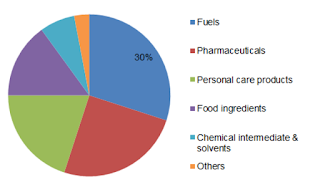Market Segmentation:
The Global Industrial Alcohol Market is segmented on the basis of the Source, Type, Application and Region.
On the Basis of the Source, the market is segmented into sugar & molasses, corn, grains, fossil fuels, and others.
Based on the Type, Global Industrial Alcohol Market is segmented into ethyl alcohol, methyl alcohol, isopropyl alcohol, isobutyl alcohol, benzyl alcohol, and others.
Get Free Sample Copy @ https://www.marketresearchfuture.com/sample_request/5787
The application segment of the Global Industrial Alcohol Market is further segmented into fuel, pharmaceuticals, personal care products, food ingredients, chemical intermediate & solvent, and others.
Market Overview:
The high purity grade refined ethyl alcohol used for other than manufacturing of liquor purposes. It is colorless, volatile, and flammable and is commonly used as a biofuel. It is found in various applications such as cosmetics, pharmaceuticals, and others. The industrial alcohol can be produced by sugar & molasses, corn, grains, fossil fuel, and others.
The Global Industrial Alcohol Market is segmented on the basis of its type as ethyl alcohol, methyl alcohol, isopropyl alcohol, isobutyl alcohol, benzyl alcohol, and others. Among these, the ethanol (grain alcohol) is the leading segment due to its wide application in the blending of gasoline, which enhances the fuel efficiency and reduces emission. Owing to its anti-bacterial properties, it is also used across the pharmaceutical and personal care industry. The methanol is the second largest segment and can be used as an antifreeze, solvent, rocket fuel, and as a denaturant for ethanol. The chemical is also used to produce biodiesel via transesterification reaction. The above-mentioned factors are expected to drive the market growth during the review period further. However, the volatility in the raw material prices and the approval from various regulatory bodies may prove to be a challenging for the market growth in the coming years.
Have Any Query? Ask Our Expert @ https://www.marketresearchfuture.com/enquiry/5787
Competitive Analysis:
Some of the manufacturers operating in the Global Industrial Alcohol Market are Cargill, Incorporated (U.S.), BASF SE (Germany), Raizen (Brazil), Exxon Mobil Corporation (U.S.), Royal Dutch Shell plc (Netherlands), Eastman Chemical Company (U.S.), Greenfield Global, Inc. (Canada), MGP (U.S.), Green Plains Inc. (U.S.), and Cristalco (France).
Regional Analysis:
The Global Industrial Alcohol Market is segmented into five regions of North America, Asia Pacific, Europe, Latin America, and the Middle East & Africa.
North America is the leading region in the Global Industrial Alcohol Market due to the high demand for high octane fuel from aerospace and transportation sector in the region.
Asia Pacific is expected to grow at a higher CAGR on account of the rising demand from growing chemical industries in countries such as China and India.
Europe is projected to witness a considerable growth in the global industrial alcohol market owing to the growing demand from various industries such as automotive, pharmaceuticals, chemicals, and others.
The untapped yet growing industrial sectors such as automotive and chemicals in GCC countries may drive the market growth during the assessment period.
Get Complete Report @ https://www.marketresearchfuture.com/reports/industrial-alcohol-market-5787
About Market Research Future:
At Market Research Future (MRFR), we enable our customers to unravel the complexity of various industries through our Cooked Research Report (CRR), Half-Cooked Research Reports (HCRR), Raw Research Reports (3R), Continuous-Feed Research (CFR), and Market Research & Consulting Services.
MRFR team have supreme objective to provide the optimum quality market research and intelligence services to our clients. Our market research studies by Components, Application, Logistics and market players for global, regional, and country level market segments, enable our clients to see more, know more, and do more, which help to answer all their most important questions.

No comments:
Post a Comment